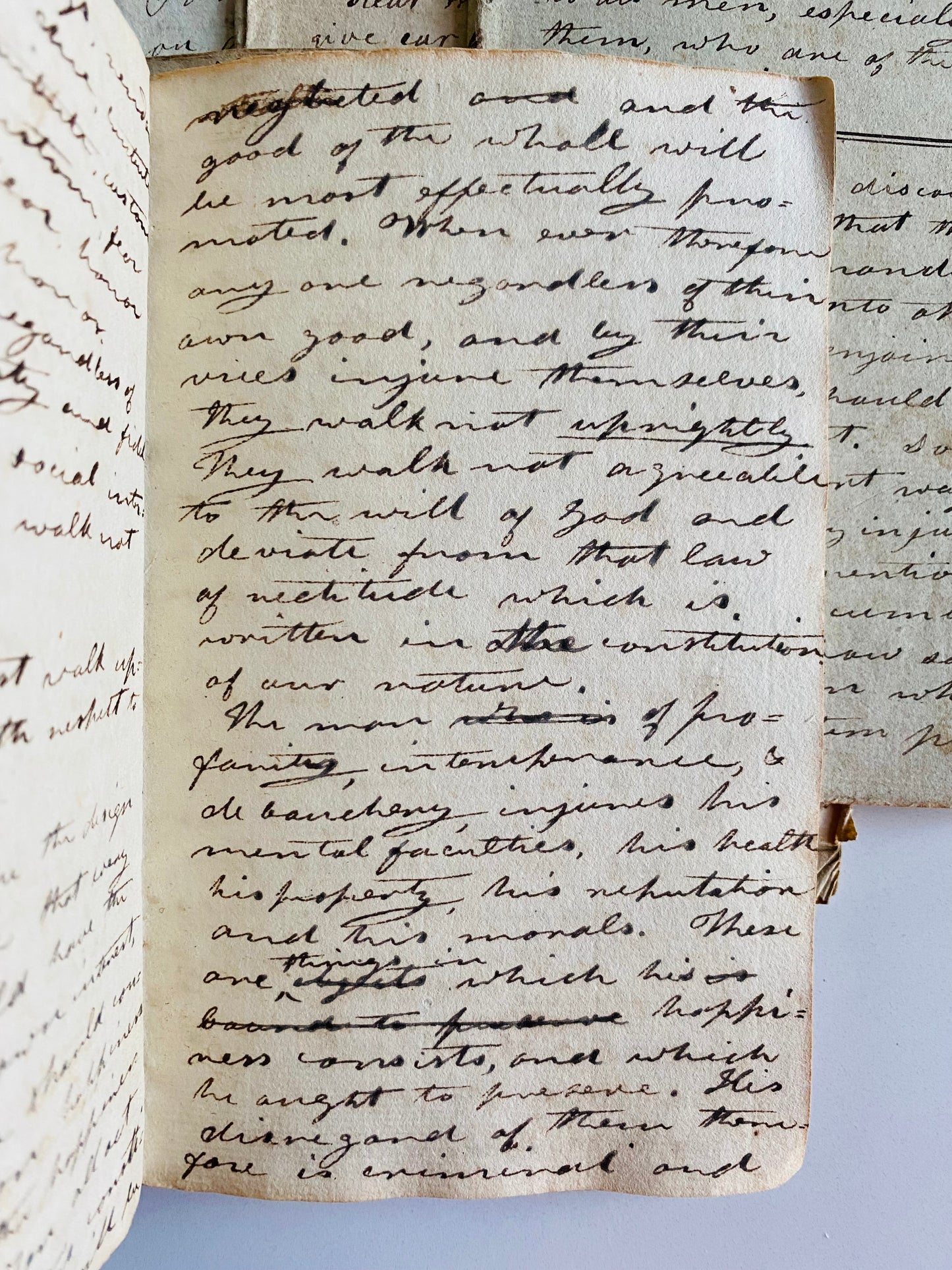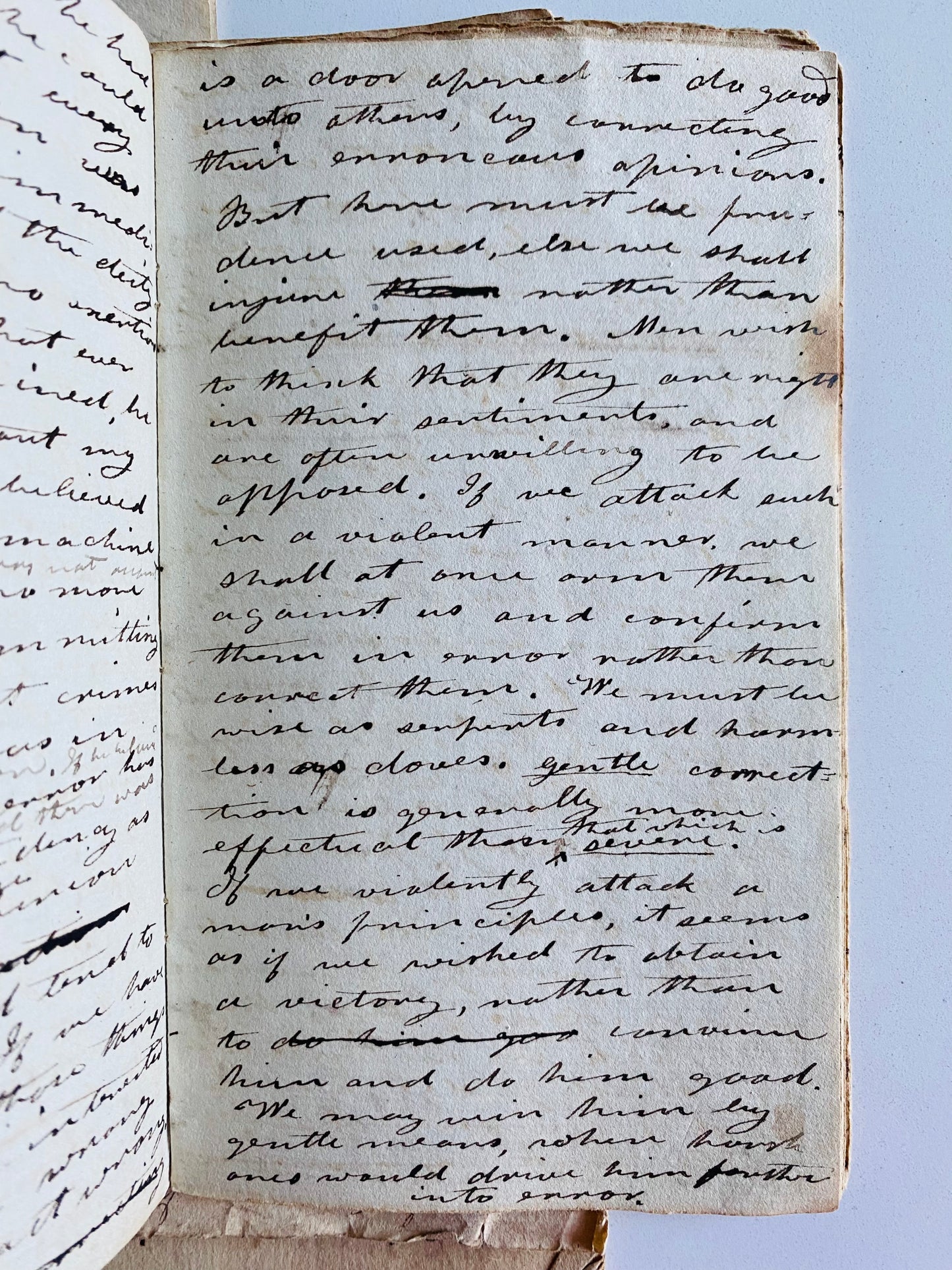Specs Fine Books
1806-1825 ELISHA D. ANDREWS. 250+ Pages of Manuscript Sermons by Vermont / Michigan Baptist & Revivalist.
1806-1825 ELISHA D. ANDREWS. 250+ Pages of Manuscript Sermons by Vermont / Michigan Baptist & Revivalist.
Couldn't load pickup availability
A wonderful little archive of over 250 pages of manuscript sermons by prominent Baptist divine, Elisha Deming Andrews [1783-1852].
Born in 1783 in Hartford, CT, he graduated Yale in 1803 and was settled as the pastor of the Congregational church at Putney, Vermont in 1807. His soon-to-be father-in-law, Joseph Lathrop, preached the Ordination sermon. It seems Andrews had already been engaged in preaching at the location the previous year. After settling at Putney, he then married Elizabeth Lathrop [daughter of above-mentioned prominent Congregational divine, Joseph Lathrop] in 1808 in West Springfield, where Rev. Lathrop was pastor.
During Elisha's pastorate in Putney, several seasons of religious interest were enjoyed; but in 1817 a powerful revival took place, the influence of which pervaded every part of the community, producing a most happy effect upon the morals and habits of the people. As the direct result of this revival, 150 persons were added to the church in a single year.
The Vermont Historical Gazetteer for 1816 records, regarding the revival, "Rev. Elisha D. Andrews in his account of the interesting revival of 1816 states that 30 persons united with this church [i.e. the Baptist Church at Fairfax, near Putney] as the fruit of that revival." One history records that Andrews took these 30 converts and formed a Baptist church. The records are unclear on this point.
Over time, Andrews seems to have become persuaded by and joined in theologically with the Baptists and it seems later with the Campbellites, i.e. Christian Church. Perhaps this happened as he worked with the Baptist church mentioned above during the revival of 1816 and 1817. In 1822 he published a small work interacting with Baptist, Charles Brooks, on Christian Communion [which flowed from believer's baptism]. There was of course some irony in this. Joseph Lathrop had a rather heated controversy with the Baptists in the 18th century and had written a popular and oft-reprinted work against them. Then his daughter went and married one. We might imagine holidays could be tough, but it seems not to have impacted the friendly family relationships.
From Putney, Elisha and his family emigrated to West Bloomfield, Ontario County, N. Y., and from there to Mendon, Monroe County, in 1829, and in 1831 to Pittsford, same county. In 1841 the family removed to Armada, Mich., and settled upon 1,200 acres of land purchased from the government and is described in local histories as one of the pioneers of the area.
During these years, he pioneered a work of the Christian Church and "aided very much in the development of the religious sentiment of northern Macomb. He held meetings at the houses of the settlers or at the schoolhouse. He assisted often in the burial service for the Bottlers, and cheered by his counsel and comfort the sick and the dying."
He passed away in Michigan in 1852. Two of his sons became prominent, one as a Congressman for Michigan, and the other as a missionary to Hawaii, i.e. Dr. Seth Lathrop Andrews [departed for Hawaii 1837].
The sermons include:
Proverbs 10.9, Preached November 16, 1806. 40pp.
Revelation 3.20. Preached November 30, 1806. 45pp.
Matthew 10.32 & 33. Preached July, 1809. 40pp.
Galatians 6.10. Preached April 9, 1809. 32pp.
Psalm 39.12. Preached September, 1813. 4pp.
Job 28.28. Preached December 1814. 17pp.
Lamentations 1.12. Preached July, 1818 [Funeral Discourse]. 32pp
Isaiah 9.6 & 7. Preached January, 1820. 16pp.
John 21.17. Preached August, 1822. 8pp.
Philippians 1.27. Preached January 5th, 1823. 19pp.
Genesis 28.16 & 17. Preached June, 1825. 1p.
Also includes a partial sermon on Daniel 10.11 from 1807 [4pp]; and an apparently unpublished 15 stanza poem. It is unclear whose hand this is in. It is docketed, "Found among Father's (S. L. Andrews,) pension papers." This would be Seth Lathrop Andrews [1809-1893; son of Elisha; he was a missionary in Hawaii from 1837 forward]
Morning by Morning
Morning by morning, as with heavenly manna
The hosts of Israel were freely fed
So we, who follow now the Christian banner
Have need each day to take our daily bread.
Morning by morning they were told to gather
According to his eating, every one,
No man had need to stint himself, but rather
To take his fill - no robbery could be done.
No one was told to measure by his neighbor
What the allowance for each day should be
But for himself and for his tent, his labor
So gather what was given fresh and free.
Not for a month, or week, or e'en the morrow
Morning by morning there was still to spare
With faith unwavering, no troubles borrow
That next day's needs should lack an ample share.
&c. &c.
A separate but similar archive of material is held by Michigan State University.
Share
















